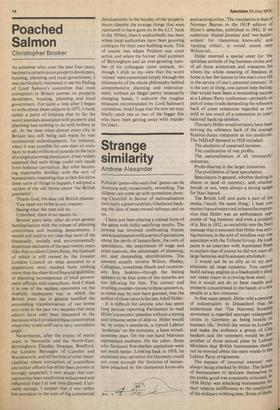Poached Salmon
Christopher Booker As someone who, over the past four years, has kept a certain eye on property developers, housing, planning and local government, I was particularly interested to see the finding of Lord Salmon's committee that most corruption in Britain centres on property developers, housing, planning and local government. For quite a time after I began to write about these subjects in 1972. I made rather a point of insisting that by far the worst scandals associated with property and planning had nothing to do with bribery at all. At the time when almost every city in Britain was still being laid waste by vast commercial redevelopments, for instance, when it was possible for one man or company to make millions of pounds on the turn of a single planning permission, it was widely assumed that such things could only result from hideous corruption. But after becoming reasonably familiar with the sort of bureaucratic reasoning that in fact did allow these sorts of things to happen, I adopted a variant of the old rhyme about 'the British journalist':
Thank God, the dear old British planner You need not bribe in any manner.
Seeing what the man will do Unbribed, there is no reason to.
Several years later, after an even greater familiarisation with the crimes of planning committees and housing departments, I would still hold to my view that most of the financially, socially and environmentally disastrous decisions of the past twenty years (like that to allow Centre Point, the freehold of which is still owned by the Greater London Council on what amounts to a peppercorn rent) resulted from nothing more than the sheer blind financial gullibility or planning incompetence of local government officials and councillors. And I think it is one of the saddest comments on the woefully inadequate way in which the British press has in general handled the astonishing transformation of our towns and cities in the past two decades that most editors have only been interested in the decisions which produced these catastrophes when they could sniff out a 'sexy corruption angle'.
Nevertheless, after the events of recent years in Newcastle and the North-East, Birmingham, Dundee, Swansea, Bradford, the London Boroughs of Camden and Wandsworth, and all the host of other muni cipalities where corruption of councillors and senior officers has either been proven or strongly suspected, I now accept that cor ruption has been much more widespread and influential than I at one time allowed. Curi
ously enough, I suspect that it was rather less prevalent in the area of big commercial developments in the heyday of the property boom (despite the strange things that were rumoured to have gone on in the LCC back in the 'fifties), than it undoubtedly has been where local authorities have been granting contracts for their own building work. This of course was where Poulson was most active, and where the former chief architect of Birmingham and an ever-growing number of his colleagues came unstuck. Although I stick to my view that the worst 'crimes' were committed simply through the inhumanity of the whole philosophy behind comprehensive planning and redevelopment, without an illegal penny necessarily changing hands, I welcome the tougher measures recommended by Lord Salmon's committee. And I hope that the new net may finally catch one or two of the bigger fish who have been getting away with murder for years.


































 Previous page
Previous page